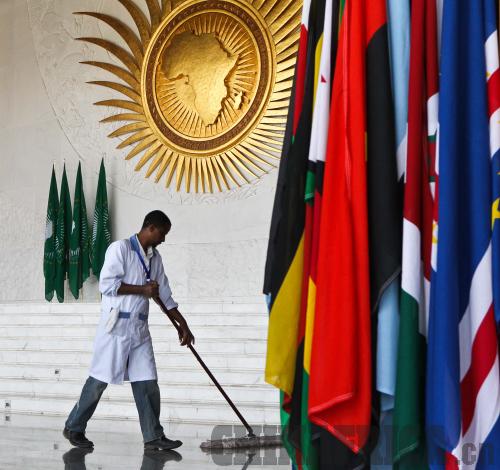|
 |
|
AU faces challenges to clean up and transform its agenda and operational style |
When asked to identify what organization's name was represented by the two letters "AU" during a current events quiz, most junior high school pupils at a West African school failed to answer the question correctly. The answers they gave ranged from Africans in Understanding, Africa Unite, and Africans in the United States. The pupils' lack of knowledge about the actual AU may be a clear reflection of how the organization is perceived in African society. It is seen as an isolated entity, whose activities appear unrelated to the common men's concerns.
OAU's positive beginnings
The apathy on the part of African citizens toward the African Union (AU) may derive from the fact that the metamorphosis of the Organization of African Unity (OAU) into the African Union in 2002 was devoid of the willpower, energy, and fanfare that greeted the establishment of the former. In 1963, the goals of the 37 independent African countries were clear as they put pen to paper and established the OAU. These nations wanted to secure independence for African nations still under colonial rule, as well as collectively defend the sovereignty and territorial integrity of African states.
African leaders vigorously pursued this popular and widespread agenda, and attracted support from organizations, nations and individuals dedicated to the cause of freedom. The OAU was popular both at home and abroad; students were galvanized, market women were mobilized, and programs that touched on OAU efforts to transform Africa were broadcast in many African languages. The OAU was able to serve as the major voice and platform that united the expectations of Africans.
The OAU played a lead role in many major transformations in Africa: the eradication of colonialism and minority rule in Africa, the resettling of numerous refugees who littered the continent during the Cold War era, and the undertaking of several development projects, which it did in partnership with the African Development Bank and other donors. The major shortcoming of the OAU was its inability to directly intervene in conflict situations across the continent, despite its popularity. This meant that African citizens trapped under dictatorial regimes could not turn to the organization for help. The dependence on donor funding also muzzled the AU, preventing it from embarking on a radically transformative agenda that would have set African countries on the path to economic independence.
Era of the AU
For reasons that were never made entirely clear to Africans, the Organization of African Unity was transformed into the African Union in 2002. Most reports say that this move was the brainchild of Libya's Muammar Gaddafi. The press release announcing the change said that the AU was being established as a more effective and efficient platform for addressing the social, political and economic realities of Africa. The new organization's major aims were fulfilling the "people's aspirations for greater unity," eliminating conflicts across the continent and harnessing the continent's resources to improve living standards.
Since inception, the AU has concerned itself with working with African governments at the policy level. The organization has been credited with successes in conflict resolution and election monitoring endeavors, with the 2008 elections in Zimbabwe being an example. The regional body has also been credited with creating several agencies and platforms for advancing democracy and human rights across the continent. These organizations include the Pan-African Parliament and the African Court on Human and Peoples' rights.
The AU is also seeking out new partnerships outside of Europe and North America. This trend was aptly illustrated by the 2012 commissioning of a new headquarters that were built and donated by China. The expansion of the AU's partnerships is a positive development for the regional body, although it is regrettable that many of these relationships still seem to foster dependency, rather than build a truly symbiotic relationship.
Challenges ahead
One of the greatest challenges facing the AU is the process of transforming itself into a people-centered organization. The AU appears to be detached from the everyday realities of the average African. It appears that the organization's dependency on donors to fund its day-to-day operations puts it at the mercy of these donors' agendas. The AU as an institution has failed to come up with, let alone follow through on, authentic African centered ideas, programs, projects and an overall agenda. The organization presents itself as a massive bureaucracy fashioned after the UN, but the AU has no funding comparable to that available to the UN.
There is a need to deconstruct the AU and build new platforms in its place. These new organizations must be simple, inexpensive, people-centered platforms that leverage emerging technology and social media and work to directly address the needs and aspirations of African people.
Unity for Africans cannot be forced or proclaimed. Unity can only be generated by activities that collectively target African people.
After 50 years of existence, the AU must strive to mobilize Africa's masses through their collective aspirations, and act as a platform for helping people achieve their goals.
There is an urgent and desperate need for a transformation of the AU's agenda and operational style. It should wean itself off of donor funds and donor's agendas, and strive to become a more grassroots-oriented organization that seeks to connect with ordinary African citizens. By reaching out, the AU will harness the greatest collective resource that Africa has at its disposal to promote the advancement and unity that the continent needs.
(Author Chika Ezeanya holds a Ph.D in African Development and Policy Studies) |